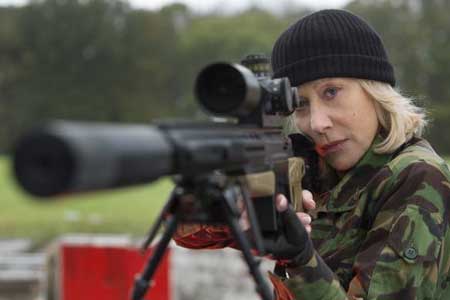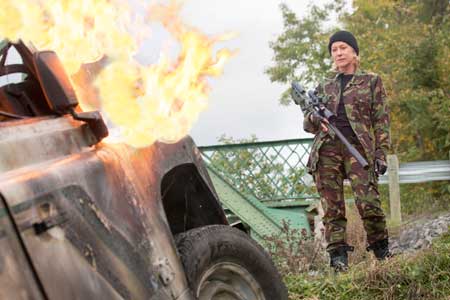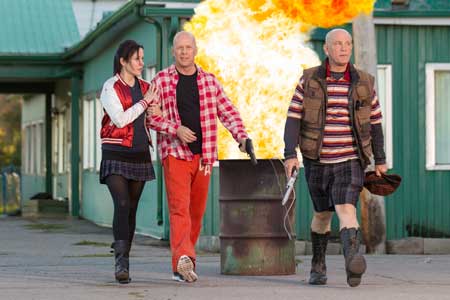Helen Mirren on RED 2 Role: ‘I love being a badass'
- Details
- Category: Interviews
- Created: Sunday, 14 July 2013 22:29
- Published: Sunday, 14 July 2013 22:29
- Written by Lupe Haas

Helen Mirren is back in the sequel to RED, and reuniting with Bruce Willis, John Malkovich and Mary-Louise Parker as aging CIA operatives. In the July 19 release, Mirren’s Victoria is given orders to take out Willis’ Frank, which sets the stage for some action hilarity.
Q: What have you heard the most about your role in the first Red story and what do you think people will be saying about this one?
Helen Mirren: Well, the word badass does occur quite frequently. I love being a badass, it’s just the best. To lurch from being a queen to a badass is really cool. People really enjoyed the first one and I’m glad we got to do a second one. It’s lovely to reprise a character as well. The character takes on a different kind of life when you come back to it. It’s like when I did Prime Suspect and I kept coming back to Jane Tennsion. It’s funny, they become more a part of your personal life. I feel that about Victoria. She’s just a great, funny, surprising sort of character to see on screen that hasn’t really been done before on screen. It’s always sort of a miracle when you can do something that hasn’t been seen before. She’s a very refined character who has this really other life.Q: What do you think fans of the first Red film will like most about your character in this one?
HM: I think just more of the same really. There are sequences that they’ll really enjoy. I love the fact that her first job in the movie is to assassinate Bruce Willis. You never quite know what side of the fence she’s on.
Q: Do you think Victoria prefers killing in formal wear or does it just work out like that?
HM: I think she absolutely prefers killing in formal wear. Quite right. As long as she’s got the right shoes on. The shoes are very important. In the first one, there’s a sequence where she has a purse and out of it comes these combat boots and that was completely my idea. I said, you can’t do this sort of job in high heel shoes. If you’re gonna be serious about it, I want her to get the right shoes on. As long as she’s got the right shoes on.
Q: Would you consider doing a superhero movie?
HM: Yeah. Superwoman really rather than girl. I’d probably have to be the baddie because I’m British. Our role in life is to be the baddie.
Q: There was a great joke in this about having a crown in the red wig. Can you talk about that and also, you have reprised your Oscar winning role on stage, will that be coming to Broadway at all?
HM: It was telecast live around the world last week. There was huge success and that was great to be part of that. Queen Elizabeth I had played her and I can’t remember what it was originally in the script, Shakespeare or something, but certainly playing it as Queen Elizabeth was my idea and getting a really bad red wig and awful costume. That was fun. It’s always nice to tongue and cheek other roles that you’ve played into other things. You’re slightly crossing the fourth wall a little bit but it’s kind of a nice way to do it, particularly, in a movie like Red where you can play around with those sorts of things.
Q: When you do this kind of film, how much preparation does it need as an actor? Does it require the same discipline as something dramatic or is it more fun and refreshing?
HM: Mostly the prep is learning how to use the equipment, the guns, and learn like you know what you’re doing. I’d never handled guns so I had to learn that. Every role brings different challenges really. The challenge in doing something like Red, and it’s why Bruce is so brilliant in these movies, is there’s a sense of self-discipline there and same with Mary Louise Parker who is brilliant at this, but at the same time there is an ease and relaxation and an ability to improvise and that’s where the real work is in a movie like this. It’s not in the preparation. If it’s in the preparation, it’s prepping yourself to realize that you’ve got to be free. It’s very difficult to be free on a film set. The whole setup is not free. It’s so technical and controlled. To get on that set and be free requires a great skill. Bruce has it to the max. I would always watch Bruce and take my lead from him. In terms of preparation, it’s very different from playing the Queen or something like that where you’ve got to watch documentaries and read books and all the rest of it. I like to be a serious actress so you do think about the implications of being someone like that. Before I did the first one, I did read some books about people who do lead that kind of life because there are things that you can pick up that are interesting.
Q: Have you seen this film with an audience yet because the audiences seem to have a special rapport with your character?
HM: Oh really? That’s great to know. I haven’t watched it with an audience yet. They think it’s the Queen, that’s what it is. They just love the idea of that.
Q: Do you see Red as a workplace comedy with a body count?
HM: Oh yes, absolutely. These are old professionals. The idea of having these retired extremely dangerous people is they have a depth of knowledge and professionalism and world-weariness that makes them very phlegmatic and down-to-Earth. It’s lovely to play that. At the same time, it’s like resentfulness that one gets as one gets older that people are sidelining you and not paying sufficient respect to the amount of work you’ve done and knowledge that you have. It’s very annoying to be sort of condescended to by younger people and that’s what these people are all about; proving themselves. I think the wonderful thing about Victoria is that she’s so sort of lady-like and together and of course, in reality, that’s what these people are like. You would never actually expect that these people are who they actually are. That’s the whole point. They don’t walk around looking like a spy. They walk around looking like ordinary people. It’s unexpected.
Q: Of all the roles you’ve played in your life, which was the most challenging to shake off emotionally and physically as a human being? And which actors from the golden age of Hollywood do you imagine having for these roles in Red 2?
HM: I think Carey Grant would be wonderful in Red. He’s got that wit and relaxation. I’m a huge fan of Carey Grant anyways and he would have been fabulous. I think Betty Davis would have been a good Victoria at one point or another. Those would be my two favorites. I would like to see Betty Davis and Carey Grant together, that would be interesting. Also, Barbara Stanwyck, Dorris Day because you’d have the unexpected thing there. You don’t expect her to do this and then she does. In terms of shaking off roles, I actually do shake off roles. I never take it home with me. I’m not that sort of actor. Playing Elizabeth the first was very demanding physically and mentally but I’m not that sort of method-y type actor. I’m just not. I can’t think of any role really that I’ve ever taken home with me in that way.
Q: In the beginning of the movie, we see Frank trying to get back to a normal life after all these murders. Do you think your character could ever not kill people for a living? If you had to escape the glitz of movies, what kind of life would you imagine for yourself? Shopping through CostCo?
HM: I love CostCo but Home Depot is my place. They know me by name in Home Depot. I do love the homey, housey stuff, however, I’ve never really been challenged really. You have you dream of what it’s gonna be like to be retired and my husband and I have been building this house in Italy that’s sort of our retirement dream but actually in reality whether we’re ever actually do that, I don’t know. It’s hard to let go of our business. It’s hard to let go of the creativity involved. It’s also hard to let go of the attention that you get. You don’t think that you’re addicted or in love with that attention. You think that that doesn’t mean anything to you until suddenly you don’t get it. Why isn’t everyone asking me questions and taking photos of me? What’s going on? Maybe in the end, it’ll be lovely to do that. It’s funny how people in your business think that if someone isn’t in the public eye, they must be dead. Not physically dead but it’s like whatever happened to them where actually they’re really happy living in a house with their family living life. There is a slight feeling in the media that if one isn’t in the media, that you don’t exist. It’s no wonder that people are so obsessed with putting themselves on Facebook and all that. To say, “I exist” and be in some kind of media. I don’t particularly agree with that, I think that existing as a human being outside of the attention of other people is the greatest type of human existence one can have.
Q: Do you prefer playing this comedic badass or the more serious dramatic role?
HM: It’s just lovely to mix it up honestly. When you’ve done something heavy and serious and demanding, it’s lovely to go and do something that is just gonna be fun. No movies are just fun because they are incredibly hard work. As much as something like Red as with something really heavy and serious like the Phil Spector piece, you’re still full of angst if your hitting it right and getting the right tone and being inventive enough and holding your own against these brilliant performers. You walk on the set and there’s John Malkovich and Anthony Hopkins and Bruce Willis and Mary Louise Parker, it’s intimidating. Will I be able to hold my own against these people? I don’t know. Every film is a challenge of some sort of another. The thing you’re trying to communicate to the audience is a sense of fun, that’s what you’re trying to communicate.
Q: You mentioned your husband Taylor Hackford and it seems like you are so lucky to be such a great actress and yet have this enduring, great love affair that so many women don’t seem to be able to manage the two.
HM: Only because they didn’t meet Taylor.
Q: Can you talk about why your relationship works so well?
HM: I think it works well because we give each other... We had the advantage of coming onto each other quite late in life. I’d say, “I can’t believe we didn’t get together when we were in our 20s. We’ve missed and that time,” and he said, “If you got together when we were in our 20s, we wouldn’t be together now” and he was absolutely right. When we were in our twenties, both of us were pursuing our goals and dreams and professions and there wasn’t room in either of our lives at that point for a relationship. We were very lucky that we met when we did. I think that’s part of the success. By then, we’d learned what both of us needed in a relationship was the ability to continue working and we recognized that need in the other person so to give the other person the freedom, liberty and encouragement to do what our professions demanded of us. We’ve always given each other complete support and freedom in that and that’s incredibly important. Also, unconditional praise. No criticism. We get enough of that, professionally speaking, in the world. We get brick bats thrown at us all the time so to each other we are both fantastic. In terms of work, we say it was darling or brilliant. That’s all I want to hear from Taylor and vice versa.
Q: Is that hard to do?
HM: No, I believe it. You watch the process and when you know the process and the struggle and the effort that went into this, it’s easy I think.
Q: Would you say age is just a number?
HM: Yes but not a meaningless one. You can’t ignore it. You have to accept it and go with it and understand that it’s inevitable.
Q: Will you do the The Audience again?
HM: They would love to do it in New York. They wanted to do it later in New York but it was too soon for me. Possibly next year. I need a break. I did 17 weeks. It was exhausting.

